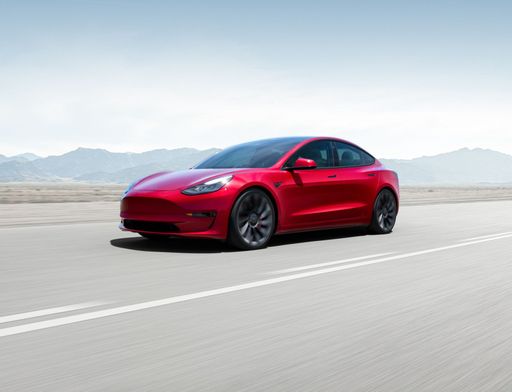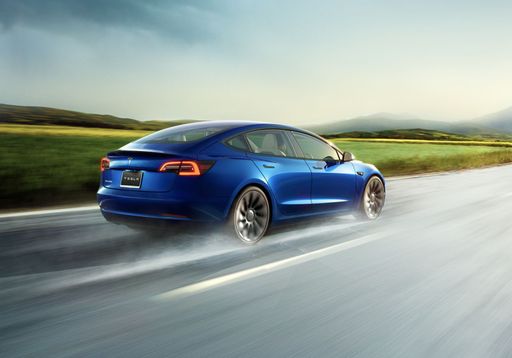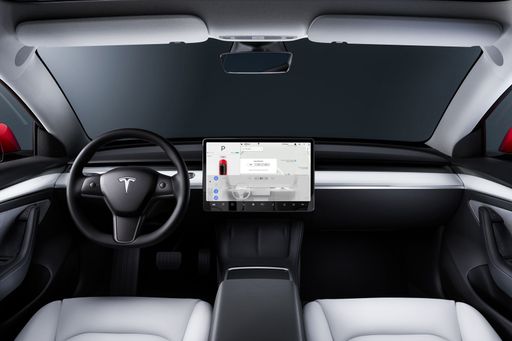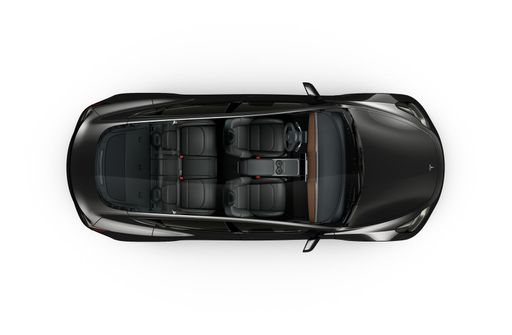Toyota Yaris vs Tesla Model 3 - Differences and prices compared
Compare performance (280 HP vs 460 HP), boot space and price (21900 £ vs 31700 £ ) at a glance. Find out which car is the better choice for you – Toyota Yaris or Tesla Model 3?
Costs and Efficiency:
When it comes to price and running costs, the biggest differences usually appear. This is often where you see which car fits your budget better in the long run.
Toyota Yaris has a significantly advantage in terms of price – it starts at 21900 £ , while the Tesla Model 3 costs 31700 £ . That’s a price difference of around 9848 £.
Engine and Performance:
Under the bonnet, it becomes clear which model is tuned for sportiness and which one takes the lead when you hit the accelerator.
When it comes to engine power, the Tesla Model 3 has a noticeable edge – offering 460 HP compared to 280 HP. That’s roughly 180 HP more horsepower.
In acceleration from 0 to 100 km/h, the Tesla Model 3 is significantly quicker – completing the sprint in 3.10 s, while the Toyota Yaris takes 5.50 s. That’s about 2.40 s faster.
There’s also a difference in torque: Tesla Model 3 pulls significantly stronger with 660 Nm compared to 390 Nm. That’s about 270 Nm difference.
Space and Everyday Use:
Cabin size, boot volume and payload all play a role in everyday practicality. Here, comfort and flexibility make the difference.
Both vehicles offer seating for 5 people.
In curb weight, Toyota Yaris is decisively lighter – 1090 kg compared to 1772 kg. The difference is around 682 kg.
In terms of boot space, the Tesla Model 3 offers significantly more room – 594 L compared to 286 L. That’s a difference of about 308 L.
When it comes to payload, Toyota Yaris distinct takes the win – 525 kg compared to 377 kg. That’s a difference of about 148 kg.
Who wins the race in the data check?
The Tesla Model 3 is far ahead overall in the objective data comparison.
This result only shows which model scores more points on paper – not which of the two cars feels right for you.
Costs and Consumption
View detailed analysis
Engine and Performance
View detailed analysis
Dimensions and Body
View detailed analysis

Tesla Model 3
Toyota Yaris
The Toyota Yaris is a sprightly city hatch that packs clever packaging, surprising comfort and fuel-sipping manners into a neat, easy-to-park package. It rewards sensible buyers with low running costs, friendly ergonomics and a forgiving drive, delivered with Japanese reliability and just enough personality to make errands feel a little less ordinary.
details

Tesla Model 3
The Tesla Model 3 slices through daily commuting with a silent, confident shove that makes petrolheads reassess their life choices, while its minimalist cabin feels more like a slick gadget gallery than a traditional car interior. For buyers after a fuss-free, tech-forward electric with plenty of grin factor and low running drama, it’s hard to beat—just don't be surprised when the car updates itself overnight.
details



Costs and Consumption |
|
|---|---|
|
Price
21900 - 40800 £
|
Price
31700 - 50100 £
|
|
Consumption L/100km
3.8 - 8.7 L
|
Consumption L/100km
-
|
|
Consumption kWh/100km
-
|
Consumption kWh/100km
13 - 16.7 kWh
|
|
Electric Range
-
|
Electric Range
534 - 750 km
|
|
Battery Capacity
-
|
Battery Capacity
83 kWh
|
|
co2
87 - 197 g/km
|
co2
0 g/km
|
|
Fuel tank capacity
-
|
Fuel tank capacity
-
|
Dimensions and Body |
|
|---|---|
|
Body Type
Hatchback
|
Body Type
Sedan
|
|
Seats
4 - 5
|
Seats
5
|
|
Doors
-
|
Doors
4
|
|
Curb weight
1090 - 1356 kg
|
Curb weight
1772 - 1929 kg
|
|
Trunk capacity
141 - 286 L
|
Trunk capacity
594 L
|
|
Length
-
|
Length
4724 mm
|
|
Width
1745 - 1805 mm
|
Width
1850 mm
|
|
Height
-
|
Height
1431 mm
|
|
Max trunk capacity
-
|
Max trunk capacity
-
|
|
Payload
289 - 525 kg
|
Payload
303 - 377 kg
|
Engine and Performance |
|
|---|---|
|
Engine Type
Full Hybrid, Petrol
|
Engine Type
Electric
|
|
Transmission
Automatic, Manuel
|
Transmission
Automatic
|
|
Transmission Detail
CVT, Manual Gearbox
|
Transmission Detail
Reduction Gearbox
|
|
Drive Type
Front-Wheel Drive, All-Wheel Drive
|
Drive Type
All-Wheel Drive, Rear-Wheel Drive
|
|
Power HP
116 - 280 HP
|
Power HP
283 - 460 HP
|
|
Acceleration 0-100km/h
5.5 - 9.7 s
|
Acceleration 0-100km/h
3.1 - 6.2 s
|
|
Max Speed
-
|
Max Speed
262 km/h
|
|
Torque
390 Nm
|
Torque
420 - 660 Nm
|
|
Number of Cylinders
3
|
Number of Cylinders
-
|
|
Power kW
85 - 206 kW
|
Power kW
208 - 338 kW
|
|
Engine capacity
1490 - 1618 cm3
|
Engine capacity
-
|
General |
|
|---|---|
|
Model Year
2026
|
Model Year
2025
|
|
CO2 Efficiency Class
B, G
|
CO2 Efficiency Class
A
|
|
Brand
Toyota
|
Brand
Tesla
|
Is the Toyota Yaris offered with different drivetrains?
The Toyota Yaris is offered with Front-Wheel Drive or All-Wheel Drive.
